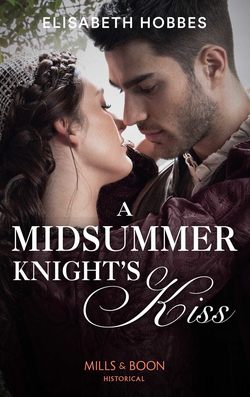Читать книгу A Midsummer Knight's Kiss - Elisabeth Hobbes - Страница 13
Chapter Four
ОглавлениеRobbie brought his buckler up in front of his face and twisted at the waist. He succeeded in deflecting his opponent’s sword before it struck him full on the helmet and the sword glanced off the edge of the small round shield instead.
Spectators roared. Beneath the cries of excitement, the whining scrape of metal on metal set Robbie’s teeth on edge. He stepped back, feet apart, together, apart once more, light on his feet and bracing himself for another onslaught. He shifted his hand on the grip of his short sword and prepared to duck again. Deflection was the key here. That and not receiving too many blows that would leave his body pummelled to wine pulp.
Was Mary watching? Robbie gritted his teeth, knowing that to risk even the quickest glance towards the fences that held back the crowds would leave him open to attack. He had beaten his first opponent, a red-haired squire from Derbyshire, but lost to his second, so this bout would decide his fate. He swore inwardly that he had been drawn against Cecil. There were friendly grudges that both would like to settle, and an opponent with no reason to fight him beyond the competition would have been preferable.
Cecil raised his sword once more. He grunted, giving Robbie enough forewarning to be able to skirt to one side and receive only a light strike to the hip with the flat of the blade.
Now he was behind Cecil, who had foolishly manoeuvred himself into one corner of the square. It was Robbie’s turn to strike a blow. Cecil was short, which gave Robbie an advantage, but thickset and powerful, which did not. Cecil lunged forward as Robbie brought his blade around. He drove his buckler flat into Robbie’s belly and managed to knock Robbie off balance, but carried on lunging. Recovering quickly, Robbie brought the sword around in an arc and caught the flailing man across the shoulder blades. A second blow delivered rapidly to the lower back sent him sprawling forward. His buckler fell from his hand and another roar went up. Cecil raised his hand in submission and Robbie had won.
He lowered his sword and held out a hand to help the fallen man to his feet. They clasped hands, bowed and faced the arbitrator.
‘Robert Danby, squire to Sir John Wallingdon of Wentbrig, is victor in this round.’
A pennant bearing Sir John’s orange-and-blue standard was added to the growing line on a board showing which squire had won honour. Robbie felt a warm rush of pride at the sight, mingling with impatience. Today he had fought under his lord’s colours. How long before he would be a knight and fight for his own honour and name? The two men retrieved their weapons and left to loud applause. They slumped beside each other on a bench and wearily removed helmets and breastplates. Half the day had passed before Robbie had taken his turn in the square. The sun was high overhead and the slight breeze did not even begin to penetrate the thickly padded layers each man wore beneath their mail shirts.
‘Well fought.’ He held his hand out to Cecil, who shook it before running his hands through his corn-blond hair. ‘I thought you had me once or twice.’
‘Perhaps next time I will. Are you competing again today?’
Robbie shook his head. ‘Tomorrow I’ll try my hand at the archery butts, and of course, I’ll join the melee on the third day.’
Unlike Cecil and a number of the other squires who entered their name into every event, Robbie was content to watch the knights demonstrating their skill. The longing to prove his worth was almost a physical pain, but he reminded himself there would be enough time to once he was knighted. The chance to observe and learn was rare.
A pageboy brought ale. Robbie downed his in three gulps before untying his hood and letting it fall to the ground. His damp hair was plastered to his head and when he finally removed the padded gambeson, his hose and the usually loose-fitting linen shift beneath it were sodden with perspiration and clinging uncomfortably to his body. He thought longingly of the fast-flowing beck at Wharram, where the water rushed ice-cold even in summer, and felt a sudden pang of homesickness.
